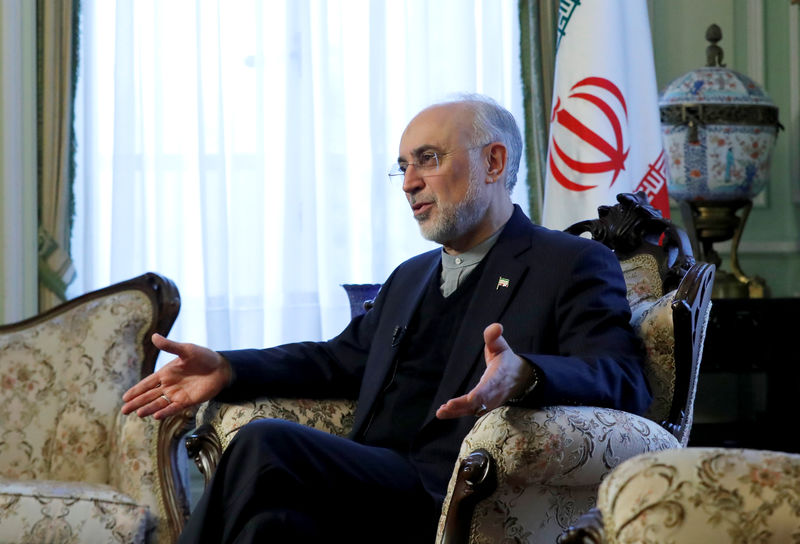By Alissa de Carbonnel
BRUSSELS (Reuters) - Iran's nuclear chief said on Tuesday he was warning the European Union's top diplomat that Iranian patience was running out on the bloc's pledges to keep up oil trade despite U.S. sanctions.
Ali Akbar Salehi, head of the Atomic Energy Organisation of Iran, said the Islamic Republic could resume enriching uranium to 20 percent purity - seen as well above the level suitable for fuelling civilian power plants - if it fails to see the economic benefit of the 2015 deal that curbed its nuclear program.
"If we cannot sell our oil and we don't enjoy financial transactions, then I don't think keeping the deal will benefit us anymore," Salehi told Reuters ahead of a meeting with EU foreign policy chief Federica Mogherini in Brussels.
"I will pass certainly a word of caution to her (Mogherini): I think the period of patience for our people is getting more limited and limited. We are running out of the assumed timeline, which was in terms of months."
Following the meeting, Mogherini said she and Salehi remained committed to safeguarding the nuclear accord.
"They equally expressed their determination to preserve the nuclear agreement as a matter of respecting international agreements and a key pillar for European and regional security," Mogherini's office said in a statement.
It said Mogherini also repeated the EU stance "on issues of concern such as Iran's role in the region" - alluding to Iranian involvement in Middle East conflicts from Yemen to Syria.
Under the 2015 deal with world powers, Iran restricted its enrichment program, widely seen in the West as a disguised effort to develop the means to make atomic bombs, in exchange for an end to international sanctions.
U.S. President Donald Trump pulled out of the accord in May, arguing it was weak because it did not halt Iran's development of ballistic missiles or support for armed proxies abroad, and reimposed sanctions on Iran's vital oil export sector earlier this month.
But Europe sees the nuclear deal as an important element of international security.
The EU and other remaining parties - China and Russia - have struggled to preserve trade incentives for Iran to respect the deal's nuclear limits under U.S. pressure.
ENRICHED URANIUM
In Brussels for talks on civilian nuclear cooperation that EU officials intended as a signal support for the accord, Salehi said the bloc's efforts were encouraging but added: "We have not yet seen any tangible results."
He welcomed an EU plan to establish a special financial vehicle for non-dollar trade with Iran but only if it could preserve Iranian oil exports - Tehran's economic lifeline.
"It (the SPV) could be helpful in keeping the deal alive," he said. "If there is nothing to reap, then what is the purpose of us staying in because voices in Iran are day by day becoming more against the deal."
Iran's oil exports are expected to drop sharply to about 1 million bpd in November from a peak of 2.8 million bpd earlier this year. However, output is expected to recover somewhat from December thanks to U.S. waivers, including for two EU nations - Greece and Italy.
Under the 2015 deal, Iran stopped producing 20 percent enriched uranium and gave up the majority of its stockpile. Salehi reiterated warnings that Iran has the technical capacity to ramp up enrichment if the deal unravels.
"It is very easy for us to go back to what we were before - even to a better position. We can start the 20 percent enrichment activity. We can increase the amount of enriched uranium."

Uranium refined to 20 percent fissile purity is well beyond the 5 percent normally required to run civilian nuclear power stations, though still well short of highly enriched, or 80 to 90 percent, purity needed for a nuclear bomb.